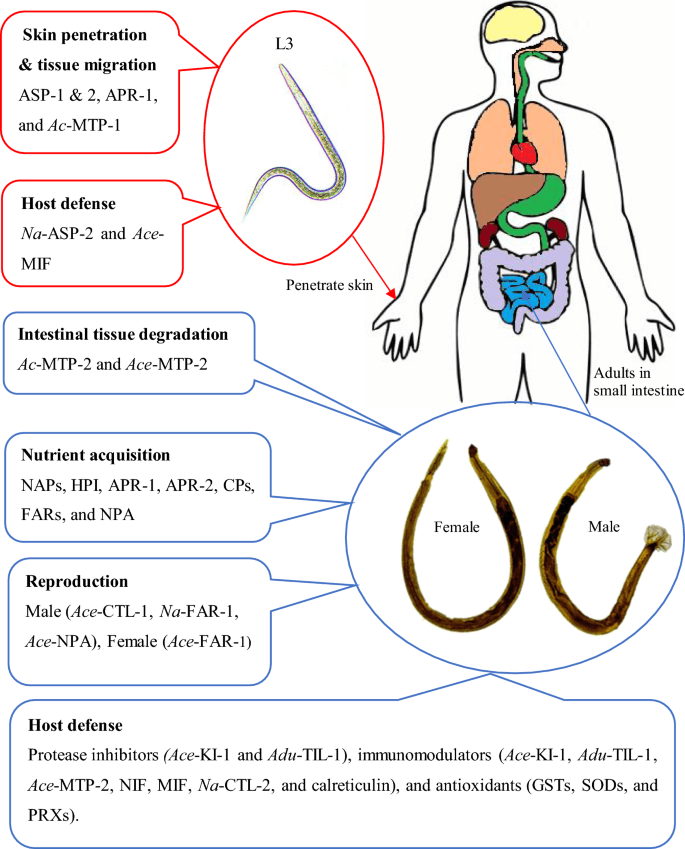Hookworms are parasitic intestinal worms that affect millions worldwide, with an estimated 406 to 480 million people globally infected. These resilient parasites derive their name from the hook-like shape of their heads, which they use to attach to the small intestine of their host. Both the larval and adult stages of the hookworm reside within the human small intestine, where they can cause a range of health issues. Infection typically occurs when individuals walk barefoot on contaminated soil or ingest it. Understanding the life cycle, symptoms, and effective prevention methods is crucial for maintaining health and preventing the spread of this common parasitic infection.
The Different Types of Hookworms
There are two primary species of hookworm responsible for human infections: Ancylostoma duodenale and Necator americanus. Alongside other soil-transmitted helminths like Ascaris and whipworm, hookworms thrive in environments where sanitation and hygiene are compromised. These parasitic worms spread through contaminated soil, making awareness of one’s surroundings and hygiene practices paramount.
Recognizing the Symptoms of Hookworm Infection
Many individuals infected with hookworms experience few or even no noticeable symptoms. However, when symptoms do manifest, they often begin with an itchy rash at the site where the larvae penetrate the skin. In cases of heavy infection, characterized by a high worm load, more severe symptoms can develop. These may include abdominal pain, diarrhea, loss of appetite, unintentional weight loss, persistent fatigue, and anemia. Anemia, a condition resulting from insufficient red blood cells, is a significant concern as hookworms feed on blood within the intestines.
For children, chronic hookworm infections can have particularly detrimental effects, potentially slowing both physical and cognitive development. The continuous loss of blood and nutrients due to a heavy worm burden can lead to developmental delays and deficiency in essential minerals like iron.
Populations Most at Risk
Certain populations are at a higher risk of contracting hookworm infections. These include individuals residing in regions with warm, humid climates where poor sanitation and hygiene practices are prevalent. Those who frequently walk barefoot, allowing direct skin contact with contaminated soil, are also highly susceptible. Children who play in areas where the soil is contaminated are especially vulnerable.
Hookworm’s Impact on Children
Heavy hookworm infections are a serious concern for both school-aged children and adults. The most severe consequences stem from blood loss, leading to anemia and protein deficiency. Children are more prone to these complications. When children are continuously infected with numerous worms, the resulting loss of iron and essential nutrients can impede their growth and cognitive development.
Understanding the Causes of Hookworm Infection
The life cycle of the hookworm begins with eggs that are passed in the feces of an infected person. Soil becomes contaminated when individuals defecate outdoors or utilize unimproved sanitation facilities, leading to direct contact between human waste and the environment. This contamination can also occur when infected human feces are used as fertilizer for crops.
Once in the soil, the hookworm eggs mature and hatch, releasing larvae. These larvae develop into a form capable of penetrating human skin. Therefore, walking barefoot on contaminated soil is a primary mode of infection. In some cases, particularly with the Ancylostoma duodenale species, infection can also occur through the consumption of contaminated larvae.
Effective Prevention Strategies
Preventing hookworm infection involves a multi-faceted approach focusing on personal hygiene and environmental awareness. To reduce your personal risk:
- Avoid walking barefoot: Especially in areas known to be common for hookworm or where soil contamination with human feces is suspected.
- Minimize skin-to-soil contact: Be mindful of direct contact with soil, particularly in unsanitary conditions.
- Practice safe food and water consumption: Avoid consuming soil or water that may be contaminated with feces.
- Wash hands thoroughly: Clean your hands with soap and water after using the toilet and before preparing or eating food.
- Prepare produce safely: Wash, peel, and cook all raw fruits and vegetables to eliminate potential contaminants.
To prevent the spread of hookworm within your community:
- Utilize improved sanitation facilities: Whenever possible, defecate in toilets or improved sanitation systems that ensure the separation of human waste from human contact.
- Avoid using human feces as fertilizer: This practice directly contributes to soil contamination.
- Educate children: Teach children the importance of handwashing as a key measure to prevent infections.
Diagnosis and Treatment
Diagnosing a hookworm infection typically involves a healthcare provider examining a stool sample under a microscope to detect the presence of hookworm eggs. This microscopic examination is the definitive method for confirming an infection.
Treatment for hookworm infection is highly effective and usually involves a course of medication lasting one to three days, prescribed by a healthcare professional. For individuals suffering from anemia due to blood loss, iron supplements are often recommended to help restore iron levels and alleviate the symptoms of anemia. Recovery is generally rapid once treatment is completed and preventive measures are implemented.

